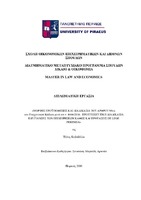Μορφές προϋποθέσεις και διαδικασία του άρθρου 99επ. του Πτωχευτικού Κώδικα μετά τον ν. 4446/2016 – Προπτωχευτική διαδικασία εξυγίανσης των επιχειρήσεων καθώς και προτάσεις de lege ferendα

Προβολή/
Λέξεις κλειδιά
Πτωχευτικός Κώδικας ; Προπτωχευτικές διαδικασίες εξυγίανσης ; Τροποποιήσεις μετά τον ν. 4446/201 ; Διάσωση επιχειρήσεωνΠερίληψη
Με την παρούσα εργασία αναλύονται οι μορφές της προπτωχευτικής διαδικασίας εξυγίανσης μετά τις τροποποιήσεις του ν. 4446/2016 και αναφέρονται προτάσεις de lege ferenda. Συγκεκριμένα παρουσιάζεται η νέα διαδικασία εξυγίανσης, που ως στόχο έχει την διάσωση των επιχειρήσεων που βρίσκονται σε οικονομική κρίση με αναλυτική αναφορά στις τροποποιήσεις που επήλθαν.
Σε περιόδους έντονης οικονομικής κρίσης, όπως συμβαίνει τα τελευταία 8 χρόνια στην Ελλάδα, με επιχειρήσεις να μαστίζονται από τεράστιες οικονομικές δυσκολίες, ήταν επιβεβλημένη η αλλαγή και ο εκσυγχρονισμός του νομοθετικού πλαισίου που επήλθε ώστε να διευκολύνεται η διάσωση των βιώσιμων επιχειρήσεων. Η επιλογή της διάσωσης, αποτελεί την μόνη ρεαλιστική εναλλακτική για τους πιστωτές, ώστε να λάβουν ένα τμήμα των όσων τους αναλογούν και δικαιούνται. Με τις στρατηγικές εξυγίανσης γίνεται προσπάθεια της επαναφοράς του οφειλέτη στην αγορά και στην επιχείρησή του. Η εμπέδωση της εξυγιαντικής νοοτροπίας, με συλλογική και ειλικρινή προσπάθεια από όλους τους εμπλεκόμενους είναι ζωτικής σημασίας για την ευόδωση του θεσμού της εξυγίανσης.
Σε ό,τι αφορά τους σκοπούς οποιασδήποτε προπτωχευτικής διαδικασίας εξυγίανσης, μπορούμε να χρησιμοποιήσουμε την εύστοχη διατύπωση δικαστικών αποφάσεων που αφορούν μεν την διαδικασία συνδιαλλαγής, έχουν όμως ως προς το σημείο αυτό γενικότερη αξία (απόφαση ΜΠΑΘ. 10689/2008 ΝοΒ 2009, 408, ΠΠΡΘΕΣ 28664/2008, ΝοΒ 2009,403 και Αλ. Ρόκας Προπτωχευτική Διαδικασία Εξυγίανσης Επιχειρήσεων, 2014 Εκδ. Σάκκουλα) «Σκοπός του νομοθέτη ήταν η πρόληψη της πτωχεύσεως, με το να τεθούν στην διάθεση του οφειλέτη νομικοί μηχανισμοί, αποτρεπτικοί της αναπόδραστα καταστροφικής ρευστοποιήσεως, ώστε οι οικονομικές δυσκολίες να αντιμετωπίζονται κατά τρόπο προσεκτικό, σοβαρό, με φαντασία, διαπραγμάτευση, ασφάλεια και διαμόρφωση περιβάλλοντος εμπιστοσύνης μεταξύ οφειλέτη και πιστωτών. Με την διαδικασία συνδιαλλαγής επιδιώκεται υπό την εγγύηση της δικαστικής αρχής και με την σύμπραξη των πιστωτών, η ικανοποίηση των τελευταίων μέσω της διάσωσης της επιχειρήσεως, που απειλείται με οικονομική κατάρρευση ή εκείνης που τα δεδομένα της επιχειρηματικής δραστηριότητας δεν αφήνουν προσδοκία επιβιώσεως, με απώτερους σκοπούς την διατήρηση των θέσεων εργασίας, την προαγωγή του τοπικού κοινωνικοοικονομικού χώρου, όπου δραστηριοποιείται η επιχείρηση και ευρύτερα της εθνικής οικονομίας»


